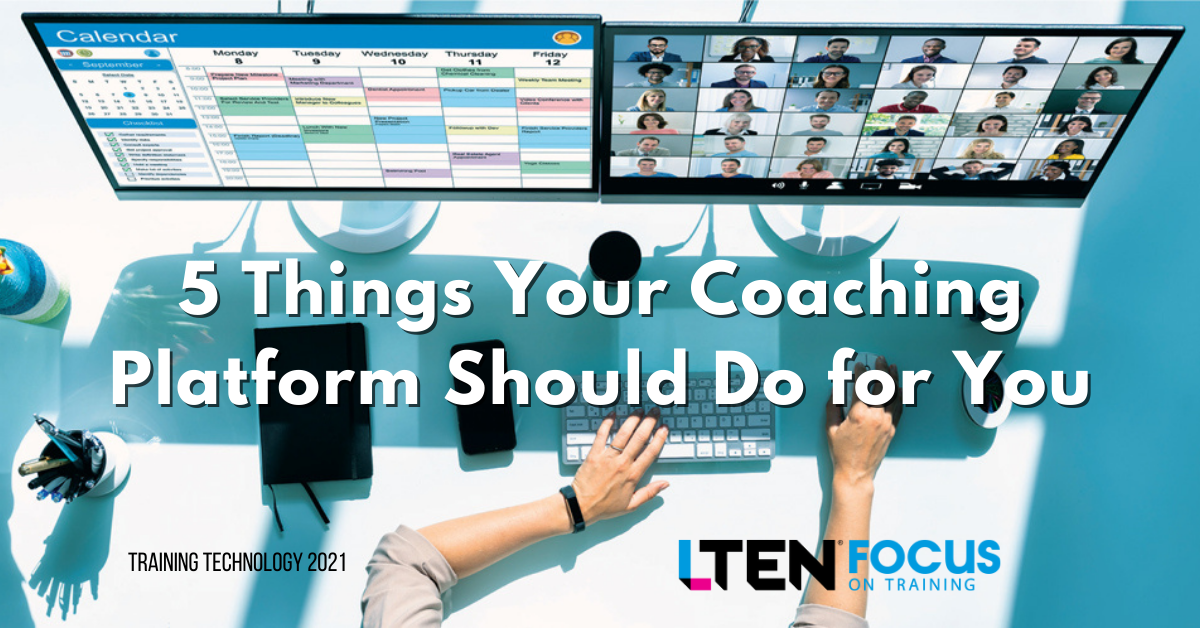
5 Things Your Coaching Platform Should Do for You
Feature Story – By Rebecca Nittolo
Here are some essentials your platform should provide
 Front-line managers (FLMs) are critical to any organization. They directly supervise up to 80% of the workforce, according to the Harvard Business Review. Unfortunately, FLMs are oftentimes pulled in so many different directions that their coaching takes a back seat. Between implementing strategy, rolling out new sales messaging and hitting their key performance indicators (KPIs), coaching can quickly become their least urgent priority.
Front-line managers (FLMs) are critical to any organization. They directly supervise up to 80% of the workforce, according to the Harvard Business Review. Unfortunately, FLMs are oftentimes pulled in so many different directions that their coaching takes a back seat. Between implementing strategy, rolling out new sales messaging and hitting their key performance indicators (KPIs), coaching can quickly become their least urgent priority.
Fortunately for FLMs, organizations are increasingly investing in technology to better equip their managers in their ever-important role as a coach, mentor and leader. To arm FLMs with what they really need, organizations need a platform that provides one place for FLMs to develop their teams and drive performance.
With many sales enablement platforms and solutions on the market, what should organizations be looking for in their platform? Here are five essentials your platform should provide:
1. A Clear Framework for FLMs
As a key driver of strategy implementation throughout an organization, FLMs should be spending most of their time assessing strategy execution in the field and providing feedback and direction to their team members. Right?
According to Gartner, FLMs are only able to devote 9% of their time on average toward team member development. So, your coaching platform should provide a simple, easy framework to help guide the coaching conversation – a coaching blueprint.
 A coaching blueprint will support your FLMs and encourage them to be the most efficient with the precious time that they do have to spend coaching their team. You likely already have a coaching model established, but a platform that distills that into a simple blueprint for FLMs will guide them through collaborative, effective coaching conversations that drive skill and performance improvement.
A coaching blueprint will support your FLMs and encourage them to be the most efficient with the precious time that they do have to spend coaching their team. You likely already have a coaching model established, but a platform that distills that into a simple blueprint for FLMs will guide them through collaborative, effective coaching conversations that drive skill and performance improvement.
According to the DDI Global Leadership Forecast, only one in three managers are effective at building talent. It’s crucial for your coaching platform to provide them with a performance framework to empower them in their coaching conversations in a manner that builds trust with their team members.
2. A Bridge Between Effectiveness and Performance
What percentage of FLMs represent top performers at your organization? And what percentage of the performance do they generate? Brian Olson reports in Disrupt magazine that the top 25% of sales managers perform at around 115% of their target, achieving approximately 39% more of their target than bottom-performing managers on average.
To close this gap, a coaching platform that can identify coaching effectiveness and its impact on skill development will be key in driving sales performance. To really drive organizational improvement, you’ll need to identify what your top-performing group is doing differently from the others and how that can be replicated.
Your platform should provide insight on what your top-performing group is doing differently, including:
- What skills are they coaching to the most?
- What are they doing and saying in their coaching conversations that is different?
- How are they helping their team members achieve their development goals?
- How are they holding their team members accountable for their development?
Your coaching platform should help you design your coaching blueprint so that you can create a level of coaching effectiveness and consistency across your organization that drives overall performance and results. If you know what the top performers are doing, you can raise the level for the rest of your management team as well.
3. Prioritization of Meaningful Data
Pricewaterhouse-Coopers reports that data-driven organizations are three times more likely to report improvements in decision-making surrounding innovation, growth and competitive advantage. Having meaningful real-time data from the field enables your FLMs and your organization to quickly diagnose opportunities to make strategic, impactful decisions.
Your coaching platform should provide this meaningful data on two main strategic levels:
- On an individual basis to allow FLMs to tailor coaching strategy to each team member.
- On a departmental or organizational level to allow your marketing, training and operations departments to create and adjust strategy and to deliver targeted, impactful training to your teams.
On the individual level, your coaching platform should provide data specific to each team member, such as sales performance and skill rating trends, to guide FLMs in personalizing coaching to each individual team member to truly drive skill improvement and, in turn, sales performance.
By allowing sales leaders, marketing, training and operations a clear line of sight to this data, they’re able to compare performance metrics, identify skill gaps, set and test strategy, adjust coaching styles and preference and provide feedback to FLMs. Those are all crucial insights for organizations to guide, support and determine specific opportunities to improve performance across the organization.
4. An Intuitive User Experience
Today’s FLMs are tech-savvy and are accustomed to using intuitive software and apps in their day-to-day lives. Your coaching platform should mirror these experiences. Knowing how precious little time your FLMs have to spend coaching their team, there’s no room for a clunky, awkward design and user experience.
Storm M. Website Statistics reports approximately 94% of a website user’s first impressions relate to the site design, and usability is a large part of any digital experience. Users are accustomed to efficient load times, mobile-friendly interfaces and intuitive navigation.
Providing your FLMs with another modern tool to make their job easier is great. But, with all the different tools and apps that they utilize daily, your coaching platform shouldn’t be just another login in a long list of tools that they won’t use because it doesn’t function intuitively for them.
Your coaching platform should provide the most pertinent, top-level information at a glance, so that FLMs can make strategic decisions quickly, while also allowing for a deeper dive of data and trends that cement your FLMs’ confidence in their strategies.
5. An Active Role in Their Own Development
Organizations that encourage accountability and provide high-quality development opportunities are 1.5 times more likely to achieve higher engagement and retention based on data extracted from the DDI Global Leadership Forecast.
The Global Leadership Forecast also reports that retention, engagement and job dedication are all influenced by how much FLMs care about a team member’s well-being. Some key questions to consider include:
- Is the FLM an effective coach who provides clear performance goals and feedback?
- Does the team member have access to necessary information and tools to guide their development?
- Do they have an up-to-date development plan?
Coaching is a two-way street. Team members crave collaboration and open dialogue. Your coaching platform should encourage FLMs to provide personalized, collaborative coaching that encourages team members’ engagement and accountability for their own development.
In addition to encouragement from FLMs, your coaching platform should make it easy for your team members to take an active role in their own development. It should be easy and straightforward for them to initiate a coaching interaction with their FLM, document their long-term development goals and track their own skill development.
Conclusion
At the end of the day, your sales enablement and coaching platform should encourage FLMs and all levels of your organization to measure coaching effectiveness and impact, better make strategic decisions, quickly assess performance to deliver a customized approach and prompt collaborative coaching conversations to drive engagement, accountability and performance improvement.
Essentially, coaching should be simple, and your platform should make it even easier. With so many other obligations to juggle on any given day, FLMs need to be reminded of what it takes to be most effective in their management, and how to stay on track.
As Vince Lombardi said, “Practice does not make perfect. Only perfect practice makes perfect.”
Rebecca Nittolo is director, Omni-coach sales for Proficient Learning. Email her at
rebecca.nittolo@proficientlearning.com.








